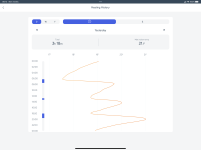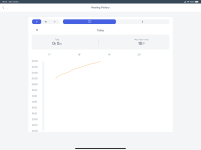They are not actually that bad. 14.4kW power for a electric combi. My neighbour has one installed and used 7200kW for the previous 12 months. So average 19.7kW a day. So that is what £2426.40 a year if on grid currently.
Lets say half your battery is used for the boiler and half for the electric you use.
-16kW even if you had to fully charge battery at night is about £1.92 right now as it is 12p/kW.
- So 8kW of your needed 19.7kW is £0.96
- 11kW is left needed. If from grid that is £4.58
Now lets assume you manage at least 6kW from the solar a day then you are only paying £2.082
Total cost is around £3.04 per day for the hot water/heating then. Of course it is more like double/triple that in winter usage compared to summer. But yeah in principle that is not all that bad with even lowish return of solar. In the summer it likely that you are only running off solar and so only need to take costs in Winter into account.
Of course this all is depending on long term. If your expected time at the house is 10+ years right now it likely makes sense. Otherwise it could be a longer return on costs up front. The other interesting element is that you can have the boiler in loft or similar also because it doesn't need a flue and install easier meaning you can gain additional usable storage space in the house if that is of use to someone.
The reason I say it doesn’t touch the sides is because once you have factored in your normal electric consumption, a 16kwh battery doesn’t have much spare capacity at all.
Yes on some days in winter you may produce 10kwh but the reality is that you’ll probably only produce 80-100kwh for the entire month when you mostly need your heating. The basic assumption is that through winter you’ll have zero spare solar capacity.
A fairly average house will be using 10kwh per day. That’s 11kwh of your battery consumed as you’ll loose 10ish% of your energy doing the AC to DC conversion. The battery probably has a 90% depth of discharge limitation also leaving you with 3kWh per day to use on heat.
That also doesn’t take into account that most battery set ups top out at 5kw, a 14.4kw electric boiler will be pulling 10kw from the grid regardless when it initially fires up.
Something like 75% of the energy you use for heating comes in a 4.5 month period. Even a conservative estimate of 8000kwh requirement times 75% over 120 days is 45kwh per day. You’ll need 50kwh of batteries to cover that daily demand.
You have real limitations on how much inverter capacity you can have on a domestic property because the local grid doesn’t want you dumping energy back into it. You need special permission to install an inverter bigger than 3.6kw, most domestic single phase inverters top out at 5kw. I doubt your DNO would approve you having more than one, certainly not if everyone does that.
TNA is quite right re generation - 11.1kwh yesterday.
To take your stats
@b0rn2sk8 - 11000kwh is ~30kwh per day (obviously much less in summer, more in winter) is more than 'scratching the sides'.
Yesterday 11kwh was solar, I also have 19.5kwh of batteries that I charged overnight at 7.5ppkwh - so 30kwh of free/cheap heating is a decent chunk.
I can imagine in a few years as batteries become cheaper/bigger, I'll have at least double that - so it's quite reasonable that it'll increasingly bite a chunk off the cost...?
If you had an air/ground source heat pump which would cut your energy consumption considerably I could see there being a case. But in reality you still need to take into account the capital cost of batteries in top of the heat pump.
The TDLR is that a domestic property can’t fit enough solar and batteries or powerful enough inverters to run a direct electric boiler. The capital cost is needed to get that functionality is also significant.
On some days you’ll have some capacity but the rest of the time you’ll be spending £lol/kWh for heating on a direct electric boiler.




